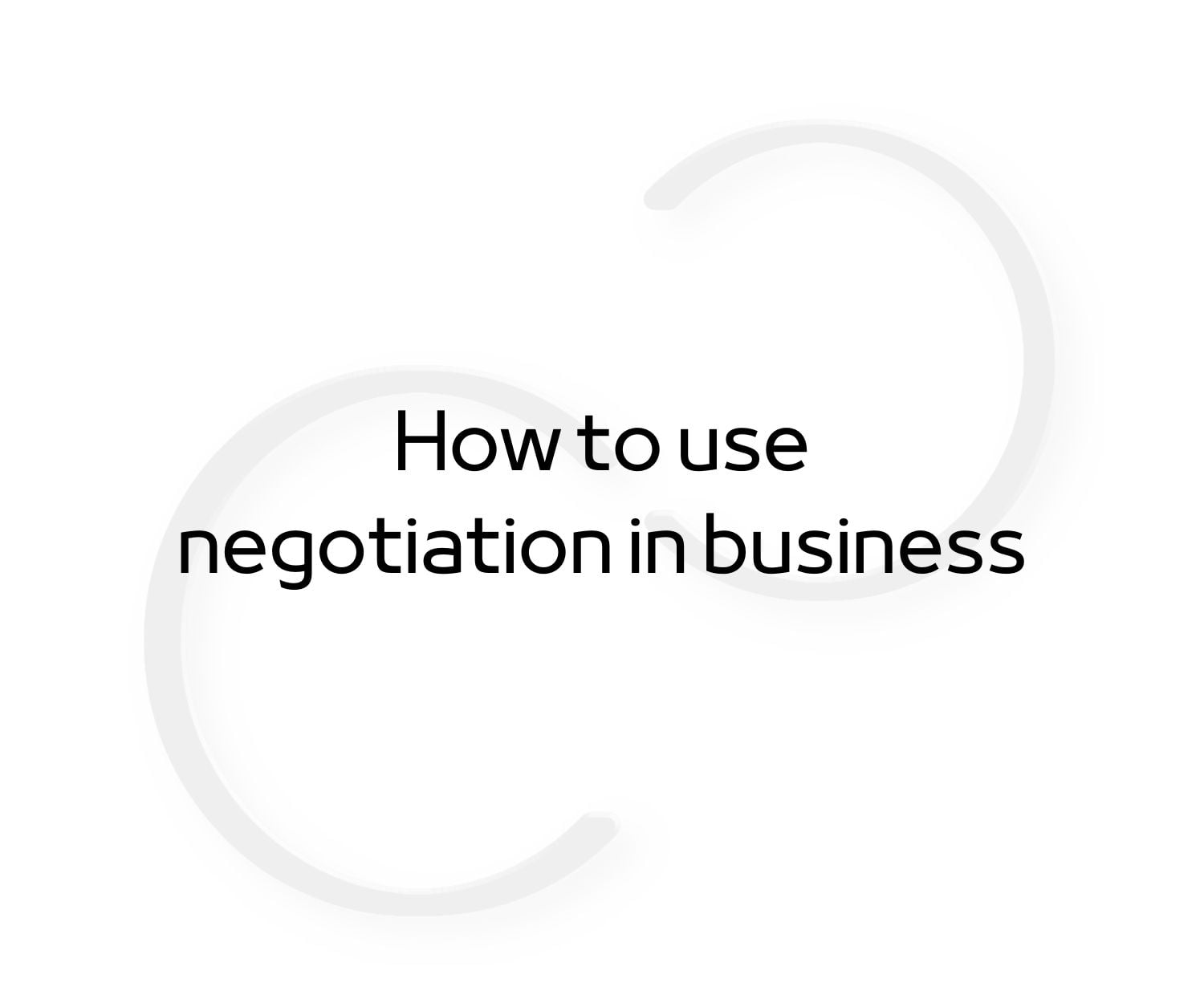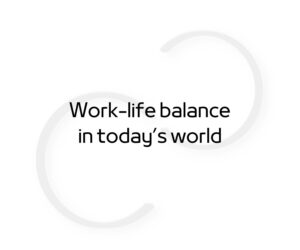I think that in business negotiations the ability to negotiate effectively is no longer a luxury; it’s an essential skill. If there’s one thing I’ve learned from the years, it is that negotiation is the heartbeat of success. My thoughts go into exploring the nuances of communication, strategic negotiation, and negotiation tactics that lead to success. Yet, business negotiation extends far beyond sales negotiations, containing diverse scenarios where communication and negotiation skills are paramount. Let’s start and see some negotiation examples.
Successful negotiation is not about getting to ‘yes’; it’s about mastering ‘no’ and understanding what the path to an agreement is.
Christopher Voss

What is negotiation
As always, I want to begin from basics – what is negotiation? At its core, it is a collaborative process through which two or more parties seek to reach a mutually agreeable solution. It’s a strategic dialogue to resolve differences, find common ground, and ultimately craft an outcome that satisfies the interests involved.
So, what is the definition of negotiation? In simple terms, it’s a conversation aimed at reaching an agreement between two or more parties.
Importance of negotiation in business
Negotiation transfuses countless aspects of business operations, and mastering this art unlocks an overload of benefits:
- Whether you’re negotiating a contract with a supplier, a salary raise with an employee, or a joint venture with another company, skilled negotiation empowers you to secure the best possible terms, maximizing value and achieving your desired outcomes.
- Effective negotiation fosters mutual respect and understanding, paving the way for long-term, collaborative relationships. By demonstrating fairness and open communication, you build trust and strengthen your network of valuable connections.
- Disagreements are inevitable in any business setting. Negotiation provides a constructive framework for resolving conflicts without resorting to harmful tactics. By finding common ground and focusing on win-win solutions, you can maintain positive working relationships and minimize disruption.
- The very act of negotiation hones your critical thinking and problem-solving abilities. By actively listening, analyzing different perspectives, and crafting creative solutions, you become adept at tackling complex challenges and navigating unexpected situations.
- The ability to negotiate effectively instills confidence and credibility. When you can effectively advocate for your needs while remaining respectful of others, you project professionalism and command greater respect in the business world.
Let’s check the data about salary negotiation success rate:
(Source)
Negotiations are everywhere
You are negotiating every day – from deciding where to have dinner with friends to sealing multi-million-dollar business deals. Negotiations are part of your daily life. Recognizing this fact is the first step to mastering the art.
How effective negotiation skills lead to successful outcomes
Mastering the art of negotiation isn’t simply about getting what you want. Here’s how effective negotiation skills translate into successful business interactions:
- Building rapport and trust
Establishing rapport and fostering trust creates a collaborative environment for negotiation. Open communication encourages transparency and exploration of creative solutions.
- Active listening and understanding needs
Effective negotiators actively listen to the other party’s needs, tailoring their approach accordingly. Understanding perspectives helps identify areas of agreement and craft mutually beneficial solutions.
- Clear communication and persuasion
Presenting needs persuasively with evidence and logic is key. Skilled negotiators avoid aggression, ensuring a constructive dialogue.
- Creative problem-solving and finding common ground
Negotiation aims for mutual satisfaction, requiring creative solutions. Identifying common ground involves proposing alternatives and brainstorming new approaches.
- Flexibility and willingness to compromise
Successful negotiation often involves compromise. Skilled negotiators remain flexible to achieve mutually beneficial outcomes.
- Building long-term relationships
Effective negotiation isn’t just about securing a single deal; it’s about fostering long-term relationships. Skilled negotiators strive to leave the other party feeling respected and valued. This paves the way for future collaborations and strengthens your professional network.
Common negotiations misconceptions
One of the most common misconceptions is that negotiation is all about price. Yeah, it’s vital, but there are so many other factors in play – terms, delivery, and building those long-term relationships.
Negotiation isn’t exclusive to salespeople. Every role in an organization involves negotiation, from HR professionals discussing employment terms to project managers aligning on project scope. It’s a universal skill.
Another myth is that negotiation is a zero-sum game, where one person’s gain is another’s loss. This outdated thinking doesn’t hold up in modern business. Successful negotiators find ways to create value for all parties involved.
Types of negotiation skills
Effective negotiation hinges not just on innate talent but also on a well-developed skillset. Here are some crucial elements in your negotiation toolbox:
| Negotiation Skill | Description |
|---|---|
| Communication | This encompasses both verbal and non-verbal communication. Clear, concise, and confident speaking allows you to effectively present your arguments and proposals. Active listening, attentive body language, and open-mindedness demonstrate respect and foster understanding. |
| Emotional Intelligence | Recognizing and managing your own emotions, as well as understanding and responding effectively to the emotions of others, is crucial. Maintaining composure under pressure, building rapport, and navigating interpersonal dynamics are essential for a productive discussion. |
| Problem-Solving & Critical Thinking | The ability to analyze situations, identify potential solutions, and think creatively is vital. Skilled negotiators can assess the needs and priorities of all involved, develop win-win solutions, and adapt their approach based on the evolving dynamics of the negotiation. |
| Research & Preparation | Knowledge is power. Thoroughly researching the subject matter, understanding the other party’s interests, and anticipating their potential arguments allows you to approach the negotiation with a well-defined strategy and the ability to address challenges effectively. |
| Building Rapport & Trust | Establishing a positive and respectful connection is essential. This involves actively listening, showing empathy, and demonstrating genuine interest in finding a mutually beneficial solution. |
| Persuasion & Influence | Clearly articulating your value proposition, using compelling arguments, and showcasing the benefits of your proposal is key to influencing the other party. However, effective persuasion avoids manipulation or coercion and relies on reason and mutual respect. |
Emotions and their role in negotiations
Sentiments play a crucial role in negotiations, influencing decision-making, whether it’s excitement, fear, frustration, or joy. Recognizing and managing these emotions can provide you with an advantage.
Successful negotiators possess emotional intelligence. They can read and respond to the emotions of others. By acknowledging and addressing these feelings, you can build trust and influence the direction of the negotiation.
The power of empathy in negotiations
Let me tell it again: empathy is your superpower in negotiation. It’s the ability to put yourself in the other party’s shoes, understand their perspective, and acknowledge their emotions. When you empathize, you set a better connection, making room for more meaningful negotiations.
Cognitive biases and their impact
Alright, it’s time to tackle some cognitive biases. Let’s talk about anchoring, confirmation, and loss aversion.
| Anchoring Bias | Occurs when the first offer in a negotiation sets the tone for the entire discussion. Being aware of it prevents being anchored by the other party’s offer. |
| Confirmation Bias | The tendency to seek and interpret information that aligns with preexisting beliefs. Overcome by staying open to alternative viewpoints and considering all angles. |
| Loss Aversion | People tend to hate losing something more than gaining something of equal value. Understanding this psychological trigger helps in framing proposals effectively. |

Setting clear negotiation objectives and goals
Negotiation is where business deals are made or broken. It’s the ultimate test of your strategic acumen and interpersonal skills. To emerge victorious in the world of negotiations, you need a solid foundation.
Set your GPS for success. Every negotiation kicks off with a destination in mind. It gives you direction and purpose. What are you aiming to achieve in this negotiation? Know it, and make it crystal clear.
Not all objectives are created equal. Some are non-negotiable, while others, well, they’ve got some wiggle room. Prioritize your goals and know what you can give a little on. Knowing your top priorities is like a compass that guides your decisions.
In the world of negotiation, knowledge is your greatest weapon. Before entering any negotiation, arm yourself with as much information as possible. Know your counterpart’s needs, preferences, and market conditions.
Role of communication skills in negotiations
Effective communication skills are the fundamentals upon which successful negotiations are built:
- The basis of any successful negotiation is a positive and trusting relationship. Communication skills play a vital role in establishing this foundation. By using clear, respectful, and empathetic language, negotiators can build rapport, foster understanding, and create a collaborative atmosphere conducive to finding common ground.
- Negotiation is not a one-sided conversation. Skilled negotiators actively listen to the other party’s needs, concerns, and priorities. By paying close attention, asking clarifying questions, and demonstrating genuine interest in their perspective, negotiators can gain valuable insights and identify potential areas of agreement.
- Effectively articulating your own needs and goals is essential. Skilled negotiators present their case, concisely, and persuasively, using evidence-based arguments and logical reasoning. However, they also avoid being overly aggressive or forceful, as this can hinder communication and create a combative atmosphere.
- While spoken language is crucial, non-verbal communication also plays a significant role. Maintaining eye contact, using open and confident body language, and displaying genuine interest through facial expressions all contribute to fostering trust and conveying your message effectively.
- Even in the most well-prepared negotiations, disagreements can arise. Skilled negotiators utilize communication skills to navigate these challenges effectively. By actively listening, acknowledging concerns, and using calm and respectful language, they can de-escalate tensions, find common ground, and move the conversation forward productively.
Creating negotiations plans
Your negotiation plan lays out your strategy, tactics, and the moves you’ll make. Be ready to pivot, but having a plan in place gives you the confidence to rock that negotiation arena.
Always have a plan B, C, and even D. If things don’t go down as expected, knowing your alternatives ensures you’re not cornered with no way out.
Part of your plan should involve understanding what concessions you want. This helps you avoid making impulsive decisions in the heat of the moment.
These three pillars of your sturdy foundation
- Setting clear objectives and goals is your compass,
- Research and information gathering arms you with knowledge,
- Creating a negotiation plan is your roadmap.
With these bad boys in place, you’re more than just negotiating. You’re equipped to make informed decisions, build trust, and create serious value in your negotiations.
A shortcut for making a negotiation plan
You don’t have to do it by yourself. Here is something to give you a helping hand for your negotiations – A ready Negotiation Cheat Sheet. Always be the most prepared person in the room! It includes 4 sections, covering all the necessary elements for every negotiation you face.
A reminder: negotiation isn’t about brute force or winning at all costs. It’s about achieving mutual success and building relationships that stand the test of time.
Importance of nonverbal communication in business negotiation
We already know that effective spoken communication is fundamental in negotiations. What about non-verbal communication? It plays an equally crucial role in influencing the outcome, from body language and facial expressions to tone of voice and eye contact. These silent cues can often reveal underlying emotions, attitudes, and intentions that spoken words alone cannot fully express.
Here’s why:
1. Building rapport and trust:
- Warm and open body language, such as a relaxed posture, open palms, and leaning in slightly, conveys approachability and interest. This can help build rapport and establish a foundation of trust.
- Maintaining eye contact demonstrates confidence, attentiveness, and genuine interest in the other party’s perspective.
- A friendly smile creates a positive and welcoming atmosphere, fostering collaboration and open communication.
2. Understanding the other party:
- Non-verbal cues can offer valuable insights into the other party’s emotional state and receptiveness to your ideas. For example, crossed arms might indicate defensiveness, while furrowed brows could suggest confusion or disagreement.
- Paying attention to nonverbal cues allows you to adapt your communication style and address any underlying concerns or objections more effectively.
3. Reinforcing your message:
- Non-verbal cues can complement and reinforce your spoken words. For example, an enthusiastic tone of voice coupled with a confident posture can significantly enhance the persuasiveness of your arguments.
- Incongruent non-verbal cues can undermine your message. If your body language conveys nervousness while your words project confidence, the other party might question your sincerity.
4. Building credibility and authority:
- Maintaining good posture and eye contact projects confidence and authority, strengthening your negotiating position.
- Using controlled, deliberate gestures conveys thoughtfulness and professionalism.
5. Managing the negotiation process:
- Subtle non-verbal cues can be used to signal openness to compromise or willingness to move forward.
- Recognizing the other party’s non-verbal cues allows you to gauge their receptiveness to your proposals and adjust your approach accordingly.
Here’s more info about accepting a salary without negotiating when accepting a job:
(Source)
Negotiation tactics and counter-tactics
To understand the power of negotiation, consider a few negotiation examples. Think of a scenario where you have to convince a potential business partner to invest in your startup, or how you’d resolve a conflict within your team.
Anchoring in negotiations
Anchoring negotiators often begin with an aggressive opening offer. The counter? Well, that’s where your research and a solid counteroffer come into play – prepare the strike. Don’t get anchored to their terms – stick to your goals.
Business negotiation examples
Negotiation skills are not theoretical concepts; they are practical tools applicable to various business scenarios. Here are a few examples to illustrate how effective negotiation plays out in real-world situations:
Negotiating a contract:
A company is negotiating a contract with a supplier for essential materials. The initial price quote exceeds the company’s budget. The skilled negotiator:
- Researches alternative suppliers to establish leverage and demonstrate their knowledge of the market.
- Presents data and evidence to justify a lower price based on factors like bulk purchase discounts or industry standards.
- Collaboratively explores alternative solutions such as extended payment terms or volume adjustments that benefit both parties.
- Communicates clearly and respectfully throughout the process, building trust and maintaining a positive relationship with the supplier.
Salary negotiation:
An employee is up for a promotion and seeks a raise commensurate with their increased responsibilities. The effective negotiator:
- Researches industry benchmarks for similar positions and gathers evidence of their accomplishments and contributions to the company.
- Clearly articulates the value they bring to the organization, highlighting the impact of their work and potential for future contributions.
- Presents a specific salary request based on their research and demonstrates their willingness to discuss alternative forms of compensation, such as bonuses or stock options.
- Maintains a professional and confident demeanor while demonstrating appreciation for the opportunity and their existing employment.
Merging two companies:
Two companies in the same industry are considering a merger. The skilled negotiators from both sides:
- Clearly define their goals and priorities for the merger, considering factors like market share, operational efficiency, and brand positioning.
- Openly discuss potential challenges and opportunities associated with the merger, fostering transparency and trust.
- Negotiate key deal points such as ownership structure, leadership roles, and integration plans, aiming for a win-win outcome that benefits both companies and their stakeholders.
- Maintain open communication and a collaborative spirit throughout the negotiation process, ensuring a smooth transition and successful integration.

Negotiation tactics in business
While honing communication skills and building rapport are crucial, successful negotiation also involves employing strategic tactics. Here are some effective approaches to consider:
1. Anchoring and framing:
- Anchoring: Be the first to present an offer, even if it’s slightly above your ideal outcome. This sets the initial reference point and influences the other party’s perception of value.
- Framing: Present information in a way that aligns with your desired outcome. For instance, emphasize cost savings instead of price increases.
2. Active listening and mirroring:
- Active listening: Pay close attention to the other party’s arguments and concerns. Ask clarifying questions to demonstrate genuine understanding and build trust.
- Mirroring: Briefly repeat key points or phrases used by the other party. This demonstrates attentiveness and fosters a sense of rapport.
3. The SALEM method:
- Separate the People from the Problem: Focus on the issue at hand, not personal attacks or blame games.
- Articulate the Needs of All Parties: Understand and acknowledge the needs and interests of everyone involved.
- Listen Actively and Empathize: Listen attentively to different perspectives and show empathy towards concerns.
- Mutually Beneficial Options: Brainstorm creative solutions that address the needs of all parties.
- Evaluate Solutions Objectively: Weigh the pros and cons of different options and strive for a fair outcome.
4. BATNA and WATNA:
- BATNA (Best Alternative To a Negotiated Agreement): Determine your best alternative if no agreement is reached. Knowing your BATNA strengthens your negotiating position and prevents you from accepting unfavorable terms.
- WATNA (Worst Alternative To a Negotiated Agreement): Evaluate the worst possible outcome if no agreement is reached. Understanding your WATNA helps you assess the risks involved and identify potential concessions that wouldn’t significantly compromise your core interests.
5. Leverage and Concessions:
- Identify your leverage: Analyze your strengths and resources that give you an edge in the negotiation. This could include expertise, market demand, or alternative options.
- Make calculated concessions: Be prepared to make concessions on less critical issues to gain leverage on more important aspects of the negotiation. However, avoid conceding on core principles or your BATNA.
6. Time Pressure and Deadlines:
- Use time pressure strategically: If applicable, introduce time limitations to nudge the negotiation forward and prevent the other party from endlessly delaying decisions. However, avoid using undue pressure tactics that could damage the relationship.
- Set deadlines strategically: Establishing clear deadlines can help keep the negotiation focused and ensure timely progress.
7. Building Rapport and Maintaining Ethics:
- Remember, it’s not just about winning: While securing a favorable outcome is important, building trust and maintaining a positive relationship with the other party can be equally valuable in the long run.
- Negotiate ethically: Avoid manipulative tactics, misinformation, or taking unfair advantage of the other party. Building trust and fostering genuine collaboration ultimately lead to more sustainable and successful outcomes.
Effective closing techniques in negotiations
The art of negotiation doesn’t end when the discussion table closes. It continues through the final phases of reaching an agreement, ensuring mutual benefit, and preventing post-negotiation disputes.
Summarizing key points
As you approach the conclusion of a negotiation, take a moment to summarize the key points and agreements reached. This ensures everyone is on the same page and minimizes misunderstandings.
The “Now or never” close
Sometimes, adding a dash of urgency can seal the deal. If there’s a killer offer on the table, make it clear it’s a limited-time opportunity, and watch them commit.
Confirming commitment
Don’t assume the deal is closed until you’ve received a clear commitment. Ask for confirmation in writing or have a signed agreement. This step adds a layer of formality and commitment to the deal.
Strategic negotiation and sales negotiation
While both strategic negotiation and sales negotiation involve reaching agreements, they differ in their scope, goals, and specific approaches. Here’s a breakdown of the key distinctions:
| Strategic Negotiation: | Sales Negotiation: |
|---|---|
| Focus: Long-term strategic objectives and partnerships. | Focus: Completing a specific sales transaction. |
| Goals: Achieve mutually beneficial outcomes contributing to overall business goals (e.g., securing long-term contracts, establishing alliances). | Goals: Close a sale at favorable terms for the seller, often within a shorter timeframe. |
| Examples: Negotiating a merger, joint venture, or resolving complex disputes. | Examples: Negotiating product price, payment terms, or addressing objections. |
| Approach: Collaborative and relationship-oriented, focusing on understanding needs and finding creative solutions. | Approach: Persuasive and focused on convincing customers of the value proposition and addressing concerns to secure sales. |
| Skills: Strong analytical thinking, problem-solving, long-term planning, and relationship-building. | Skills: Strong communication, persuasion, active listening, and deep product knowledge. |
| Key Differences: |
|---|
| Time Horizon: Strategic negotiations often have a longer-term perspective; sales negotiations focus on closing deals quickly. |
| Relationship Building: Strategic negotiations prioritize long-term relationships; sales negotiations prioritize closing immediate deals. |
| Flexibility: Strategic negotiations involve more flexibility and compromise; sales negotiations may have less, depending on the seller’s bottom line. |
| Complexity: Strategic negotiations often involve complex issues and stakeholders; sales negotiations deal with a more defined set of variables. |
In essence:
- Strategic negotiation is about building partnerships and achieving win-win outcomes for the long term.
- Sales negotiation is about closing deals and securing the best possible terms for a single transaction.

Learn negotiation skills from legends
Take a while and consider checking these masters of negotiations, and enrich your perspectives.
Negotiation skills of Sun Tzu – The Art of War
He was the Chinese military strategist, who emphasized the importance of understanding the battlefield. In the business world, this translates to understanding the competitive landscape, knowing your strengths and weaknesses, and positioning yourself strategically.
Negotiation skills of Nelson Mandela – The power of patience
The iconic South African leader, displayed extraordinary patience during negotiations. He taught us that patience is a powerful tool for achieving long-term goals.
Negotiation skills of Warren Buffett – The value of relationships
The legendary investor values long-term relationships in his business negotiations. He stresses the significance of dealing with people you trust and can build strong partnerships with.
Many resources are available to aid your development, including negotiation books, courses, and expert guidance.
A shortcut to learn negotiation in business
I’ve prepared something for those who want to learn the art of negotiation my Negotiation course. You not only have a source of knowledge but also a way to reinforce and strengthen your understanding thanks to additional materials.
Conclusion – How to use negotiation in business
Negotiation is the heartbeat of success! I mean, think about it. It’s where you create value, set the terms, and build those relationships. To master negotiation in business, you need to understand the fundamentals. This includes grasping negotiation communication techniques, using negotiation guides, and having a negotiation planner (my Negotiation Cheat Sheet for example) in place.
But here’s the deal – don’t focus only on hustling and grinding. You’ve got to tap into that human element. Empathy and emotional intelligence are your secret weapons. Put yourself in the other party’s shoes, and understand their needs. You’re building trust and rapport like a pro.
And guess what? It would be best if you had a game plan. Set those clear objectives, do your homework, and have a rock-solid negotiation plan. It’s like your business GPS – you know where you’re going.
How will you apply these negotiation principles to your business challenges and opportunities?
FAQ: How to use negotiation in business
Q1: What are some best practices for effective negotiation?
Setting clear objectives, conducting thorough research, creating a negotiation plan, and using active listening and empathy.
Q2: What are some essential negotiation skills that I can learn through training?
Crucial negotiation skills include effective communication, active listening, empathy, and adaptation to different situations. Negotiation training can provide you with the tools to navigate the negotiation process successfully.
Q3: Are there different types of negotiation, and how do they differ?
Yes, there are various types of negotiation, such as:
– sales negotiation,
– crisis negotiation,
– principled negotiation.
Each type differs in its goals, strategies, and context. Sales negotiation, for instance, focuses on closing deals, while crisis negotiation is about handling high-pressure situations.
Q4: Can negotiation skills be used in the context of job offers and salary negotiations?
Absolutely. Negotiation is often in job offer and salary discussions. It allows candidates to negotiate for better terms and employers to find mutually agreeable compensation packages.
Q5: Where can I find resources to enhance my negotiation skills and knowledge?
Resources for enhancing negotiation skills include books, courses, seminars, and expert guidance. You can find many online and offline resources to help you on your journey to mastering negotiation.
Follow my X (Twitter) for insights!





We need negotiations in so many situations in our lives. I remember my first salary negotiation with my boss. It was horrible experience! A little help please!
But hey, we live and learn, right? You’ve got this!